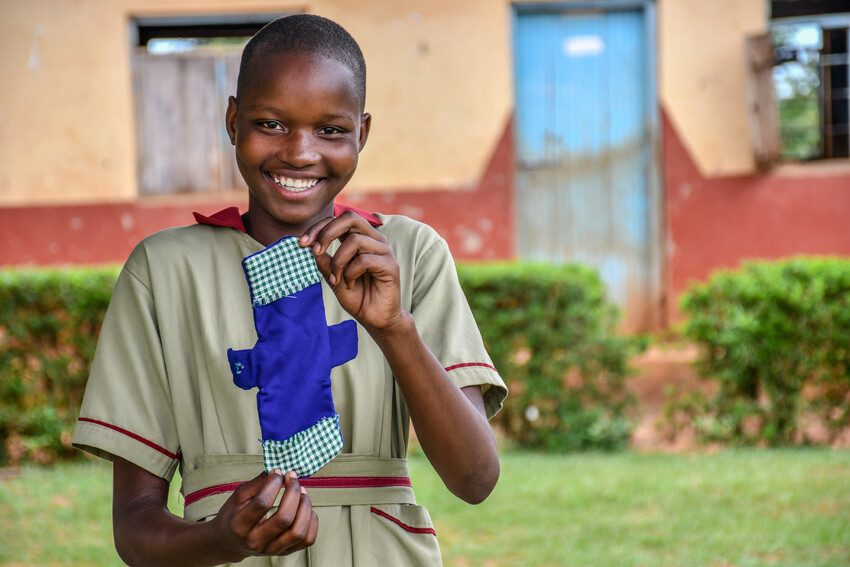Landmark study shows global gains for girls, but threats to progress loom
Groundbreaking research from Plan International has documented girls from birth for eighteen years, giving fascinating insights.
For billions of young people worldwide, menstruation is a monthly reality. Yet in many countries, they still face serious challenges when it comes to managing their periods.
Myths, stigma and harmful gender norms around menstruation exacerbate the difficulties for young people across the world.

Pictured: Zarinah, 15, from Uganda with one of the reusable sanitary pads she has made. Photo credit: Plan International.
At least 500 million girls and women – that’s one in four of the world’s female population of reproductive age – don’t have what they need to manage their period, whether menstrual supplies like sanitary pads or access to a clean toilet.
If not properly managed, menstruation can interrupt daily life. Adolescents especially experience extremely painful periods which can affect their attendance and performance at school. A lack of adequate facilities and materials, restrictions on girls’ movements during their period and feeling ashamed or ‘unclean’ also contribute to girls skipping school.
Taboos, myths and shame surrounding menstruation can lead to teasing, shaming and exclusion from daily activities and have a negative effect on girls’ feelings of dignity.
Periods are normal, but all too often, this natural and healthy part of life is seen as shameful and dirty.
Girls’ ability to manage their menstrual health is worsening due to the hunger crisis.
Sofiana, 13, from Haiti and Hamda, 15, from Somalia share their stories.
Period-shame is rooted in gender inequality. Cultural and religious traditions around periods are often derived from discriminatory, patriarchal norms about a girl’s status and place in society.
As a result, girls and women are often expected to refrain from normal activities, such as bathing or cooking and may even be banished from the home during their period. These restrictions and negative attitudes towards menstruation affect girls’ self-esteem.
Taboos around discussing menstruation mean that countless girls start their periods scared, un-informed, and without support. Many think they are sick or even dying when they bleed for the first time.
Older generations of women had very different experiences of managing their periods to teenagers today – but modern girls are still calling for better, cheaper access to sanitary products, and continue to face widespread stigma and prejudice surrounding periods.
Here, we delve into conversations between grandmothers, mothers and daughters about menstruation through the ages.
Plan International has worked for many years with girls and boys, women and men to break down taboos and barriers when it comes to menstrual health.
We have trained teachers and health staff to run awareness-raising sessions about periods. We support girls and young women to access quality menstrual products that meets their needs, and we work with schools to construct girl-friendly latrines, with areas to wash and change menstrual pads.
And we’ve worked with governments, for example in Uganda, to put menstrual health on the school curriculum, so that school children know that periods a normal part of life.
Education about periods should start early and include all genders – this is critical to tackling taboos and stigma, and promoting gender equality.
By improving menstrual health and tackling period-shame we can improve girls’ attendance and performance at school; break down taboos and misconceptions around menstruation; raise girls’ self-esteem and enable girls to fully participate in all aspects of society.
Periods are natural, not shameful. No woman, girl, or person who menstruates should start their period without knowing what is happening to their body, and without access to sanitary products. Every person who menstruates should have access to accurate information and a clean, private toilet facility, including and especially in schools.